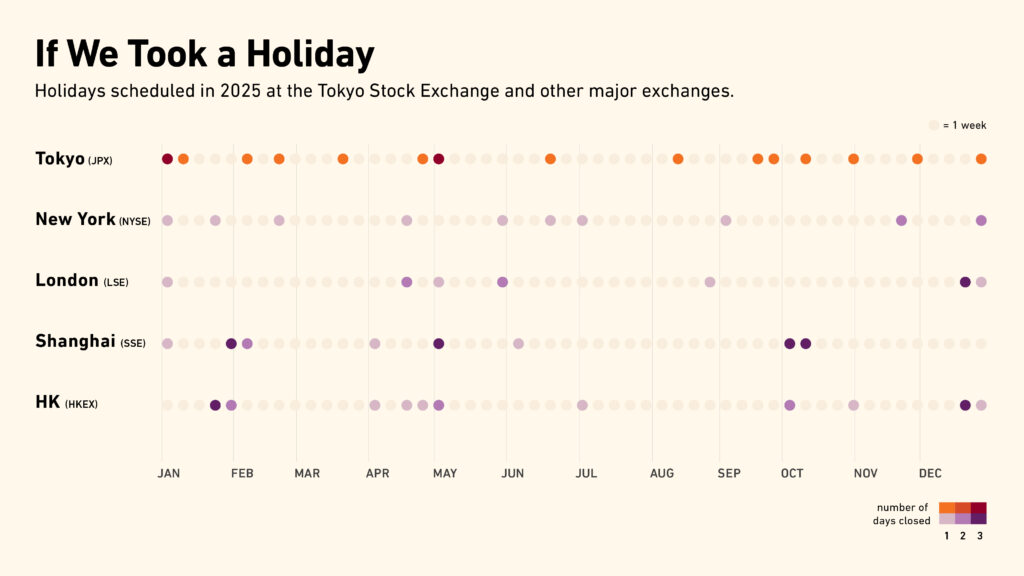When the vernal equinox arrives on March 20 and heralds the arrival of spring, traders in the US aren’t likely to notice. On Wall Street, it’s just another trading day. In Japan, though, traders will have plenty of time to contemplate the turning of the seasons, because the equinox is a national holiday and the Tokyo Stock Exchange will be closed.
The equinox is just one of the myriad holidays that shut down the capital markets in Japan. There are national holidays to celebrate the young, the old, the mountains, the sea, emperors, equinoxes, culture, and trees. The Tokyo Stock Exchange will close for 18 different holidays in 2025. No other major exchange closes for as many individual holidays.
The pan-Europe Euronext exchanges will close for only six holidays. Stock exchanges in London and Frankfurt are closing for eight. The New York Stock Exchange is closed for ten holidays. Each of those holidays comprise only one trading day. The Shanghai Stock Exchange closes for seven national holidays, but is closed for 18 trading days, including six for Chinese New Year in January and February and five for National Day in October. The Hong Kong Stock Exchange closes for 13 holidays that stretch across 15 trading days.

Japan’s holidays reflect the nation’s traditional cultural history and, in particular, its indigenous religion, Shinto, in which nature is a large focus. But the heavy schedule of holidays is also in some ways a counter-balance against Japan’s business culture. Japanese workers are so driven that they tend to not take paid vacation days. Last year, the average Japanese worker left seven of 19 paid vacation days unused, according to a report from Expedia. In France and Germany, it was only two. In the US and Canada, it was one. The Japanese work so much, in fact, they even have a word for it: karoshi, which translates as “overwork death.” The numerous holidays are a forced protection against karoshi.
There are holidays that are also celebrated globally such as New Year’s Day, and Japan has its own version of Labor Day and Thanksgiving called Labor Thanksgiving Day (essentially combining the two holidays into one). But there are many holidays that are unique to Japan. Here’s a list of them, and the dates that they fall on in 2025:
- January 13: Coming of Age Day, which is set aside to congratulate and encourage people as they reach adulthood.
- February 11: National Foundation Day celebrates the mythological founding of Japan and the accession of its first emperor in 660 BCE. The 2025 edition, therefore, celebrated the 2,685th anniversary of Japan’s founding.
- April 29: Showa Day is set aside to honor the Emperor Showa (Hirohito), Japan’s longest serving emperor, who ruled from 1926 to 1989.
- May 5: The very young get their own day, Children’s Day.
- July 21: On Marine Day, the island nation takes a day to show appreciation for the ocean.
- August 11: Mountain Day is set aside to honor the archipelago’s mountains. Fully 80% of Japan is made up of mountains, which means most of its 124 million citizens live in small, tiny flat areas such as Tokyo and Osaka, making them among the most crowded metropolitan areas in the world.
- September 15: As children and children coming of age get their own day, Respect for the Aged Day is set aside to honor the nation’s elderly.
- September 23: The exchange closes for the Autumnal Equinox, but this holiday has an interesting history. Before World War II, it was a Shinto holiday to honor and respect family ancestors. The post-war era saw the holiday split from its religious background, just as the state and religion were separated, but some families still pay a visit to family graves, clean them up, offer flowers, burn incense, and pray.
- October 13: Sports Day commemorates the opening of the 1964 Summer Olympics, held in Tokyo.
- November 3: Culture Day is celebrated with 300,000 different matsuri, or festivals, focused on the nation’s arts and culture. Top-ranking matsuri are known to mobilize several million people and contribute up to 1% of GDP for some the country’s regional prefectures. Almost every shrine holds its own festival, many of them going as far back as several hundred years. ∎





